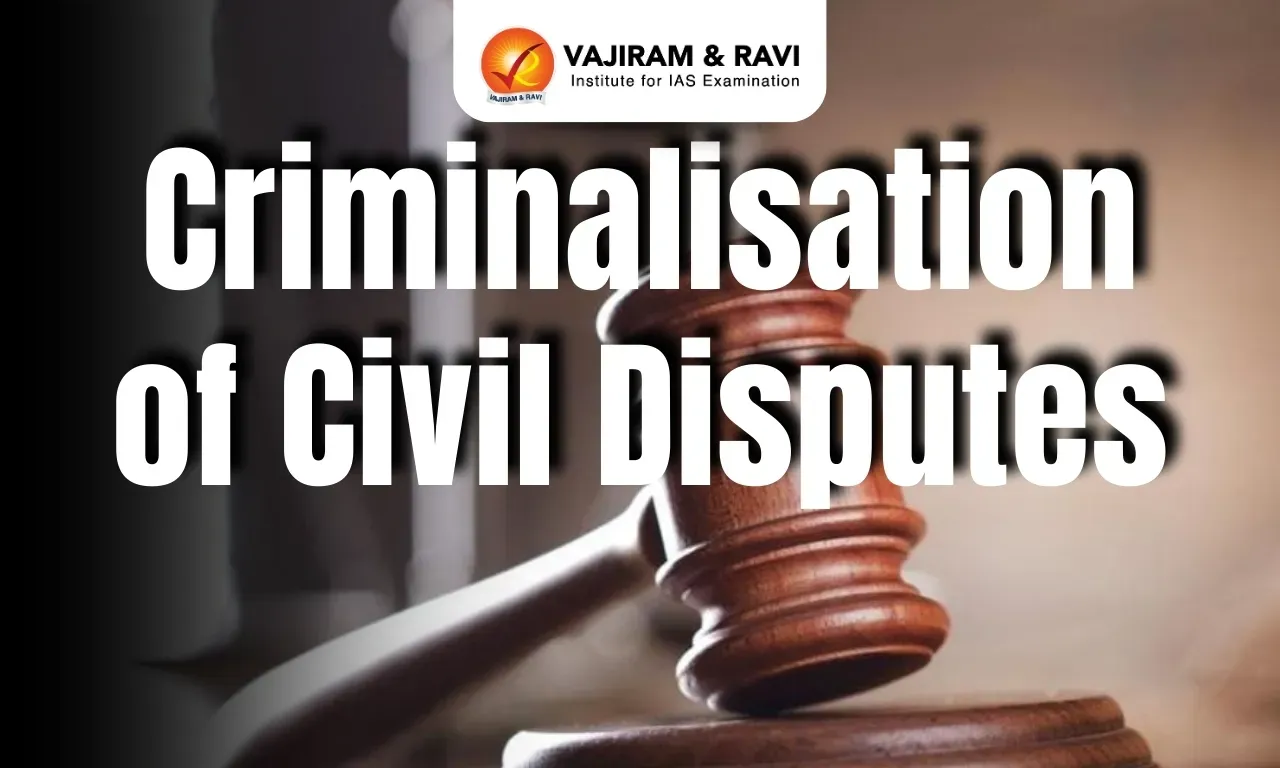What’s in Today’s Article?
- Criminalisation of Civil Disputes Latest News
- CJI’s Remarks on Converting Civil Disputes into Criminal Cases
- Modus Operandi of Converting Civil Disputes into Criminal Cases
- Reasons Behind the Shift to Criminal Cases
- Courts’ Stance on Civil vs. Criminal Disputes
- Way Forward: Court’s Recommendations to Curb Abuse of Criminal Law
- Criminalisation of Civil Disputes FAQ’s
Criminalisation of Civil Disputes Latest News
- Chief Justice of India Sanjiv Khanna recently criticized the Uttar Pradesh government for the increasing practice of converting routine civil disputes into criminal cases.
- His remarks came during a hearing on an appeal by two individuals involved in a cheque bounce case, who were additionally charged with serious criminal offenses such as breach of trust, intimidation, and criminal conspiracy.
- The Chief Justice expressed concern over the misuse of criminal law to pressurize parties in civil matters.
CJI’s Remarks on Converting Civil Disputes into Criminal Cases
- Chief Justice of India Sanjiv Khanna expressed strong disapproval of the growing trend of converting civil disputes into criminal cases, particularly in Uttar Pradesh.
- The Chief Justice emphasized that disputes over civil issues should not be treated as crimes and warned of a breakdown of the rule of law in the state.
Misuse of Criminal Law in Civil Matters
- The Chief Justice highlighted the concerning trend where civil cases—such as cheque bounce, money recovery, contractual disagreements, inheritance issues, property partitions, and commercial transactions—are increasingly being framed as criminal cases.
- This shift often aims to apply pressure on the opposing party, undermining the fairness of the legal process.
Modus Operandi of Converting Civil Disputes into Criminal Cases
- A common tactic in these cases is to accuse the opposing party of dishonest intentions from the outset of a civil arrangement, such as a loan, contract, or agreement.
- For example, if Mr. A lends money to Mr. B, and Mr. B fails to repay, the matter typically falls under civil law.
- However, Mr. A may claim that Mr. B never intended to repay the loan and obtained the money through deceit.
- This leads to criminal charges under Section 420 (cheating) of the Indian Penal Code, now included under Section 318 of the Bharatiya Nyaya Sanhita (BNS).
Reasons Behind the Shift to Criminal Cases
- Legal experts suggest that many individuals perceive civil law as an ineffective remedy due to the prolonged nature of civil litigation.
- This is particularly evident in family disputes, where extended legal battles often result in the breakdown of marriages or family relationships.
- There is also a belief that criminal cases can prompt quicker settlements. In some instances, people with influence or by incentivizing police officials get FIRs registered to pressure the opposing party.
Growing Backlog in Civil and Criminal Cases
- As per the National Judicial Data Grid, there are currently over 1.08 crore civil cases pending in District Courts across India, with more than 68% of these cases being older than one year.
- Additionally, out of the 4.52 crore total pending cases, 76% (3.44 crore) are criminal cases.
Courts’ Stance on Civil vs. Criminal Disputes
- The Supreme Court has consistently cautioned against the misuse of criminal law for matters that are essentially civil in nature.
- In January 2000, in the case of G. Sagar Suri vs. State of UP, the Court warned that criminal proceedings should not be used as a shortcut for civil remedies.
- It emphasized that criminal courts must exercise great caution before issuing processes, as criminal charges carry serious consequences for the accused.
Court’s Observations in C. Subbiah @ Kadambur Jayaraj vs. The Superintendent of Police (May 2024)
- The Supreme Court remarked, “It cannot be doubted that a dispute which is purely civil in nature has been given a colour of criminal prosecution alleging fraud and criminal breach of trust by misusing the tool of criminal law.”
- This highlights the growing concern over the misuse of criminal law in civil matters.
Way Forward: Court’s Recommendations to Curb Abuse of Criminal Law
- In the Indian Oil Corpn. vs. NEPC India Ltd. (2006) case, the SC emphasized that while individuals with legitimate grievances should have access to criminal law remedies.
- However, those who initiate or continue criminal proceedings knowing they are unwarranted should be held accountable.
- The Court suggested that such complainants should face legal consequences after the criminal proceedings are found to be baseless and civil remedies should be pursued instead.
Practical Solution: Use of Section 250 Cr.P.C.
- To prevent the misuse of criminal law, the Court recommended a practical solution: frequent use of Section 250 of the Criminal Procedure Code (Cr.P.C.).
- Section 395 of the Bharatiya Nagarik Suraksha Sanhita (BNSS), 2023, deals with orders to pay compensation to victims of crimes.
- This section allows courts to grant compensation to innocent parties who are subjected to unwarranted accusations.
- The Court proposed that judges should exercise this power more often when they discern malice, frivolousness, or ulterior motives behind criminal complaints.
- This would help deter unnecessary prosecutions and prevent harassment of innocent individuals.
Criminalisation of Civil Disputes FAQ’s
Q1. What is Criminalisation of civil disputes?
Ans. It refers to using criminal law to settle civil issues like loans, contracts, or inheritance through pressure or intimidation.
Q2. What did the Chief Justice say about civil disputes?
Ans. CJI criticized converting civil issues into criminal cases, calling it a threat to rule of law, especially in Uttar Pradesh.
Q3. Why are civil disputes turned into criminal cases?
Ans. Due to delayed civil trials, people misuse criminal charges to pressure opponents into quicker settlements or compromises.
Q4. What has the Supreme Court ruled on this misuse?
Ans. The Court warned against criminal courts being used as shortcuts for civil remedies and stressed cautious process issuance.
Q5. What is the court’s recommended solution?
Ans. Frequent application of BNSS Section 395 (formerly CrPC 250) to penalize false complainants and prevent legal harassment.
Last updated on June, 2025
→ UPSC Notification 2025 was released on 22nd January 2025.
→ UPSC Prelims Result 2025 is out now for the CSE held on 25 May 2025.
→ UPSC Prelims Question Paper 2025 and Unofficial Prelims Answer Key 2025 are available now.
→ UPSC Calendar 2026 is released on 15th May, 2025.
→ The UPSC Vacancy 2025 were released 1129, out of which 979 were for UPSC CSE and remaining 150 are for UPSC IFoS.
→ UPSC Mains 2025 will be conducted on 22nd August 2025.
→ UPSC Prelims 2026 will be conducted on 24th May, 2026 & UPSC Mains 2026 will be conducted on 21st August 2026.
→ The UPSC Selection Process is of 3 stages-Prelims, Mains and Interview.
→ UPSC Result 2024 is released with latest UPSC Marksheet 2024. Check Now!
→ UPSC Toppers List 2024 is released now. Shakti Dubey is UPSC AIR 1 2024 Topper.
→ Also check Best IAS Coaching in Delhi
























